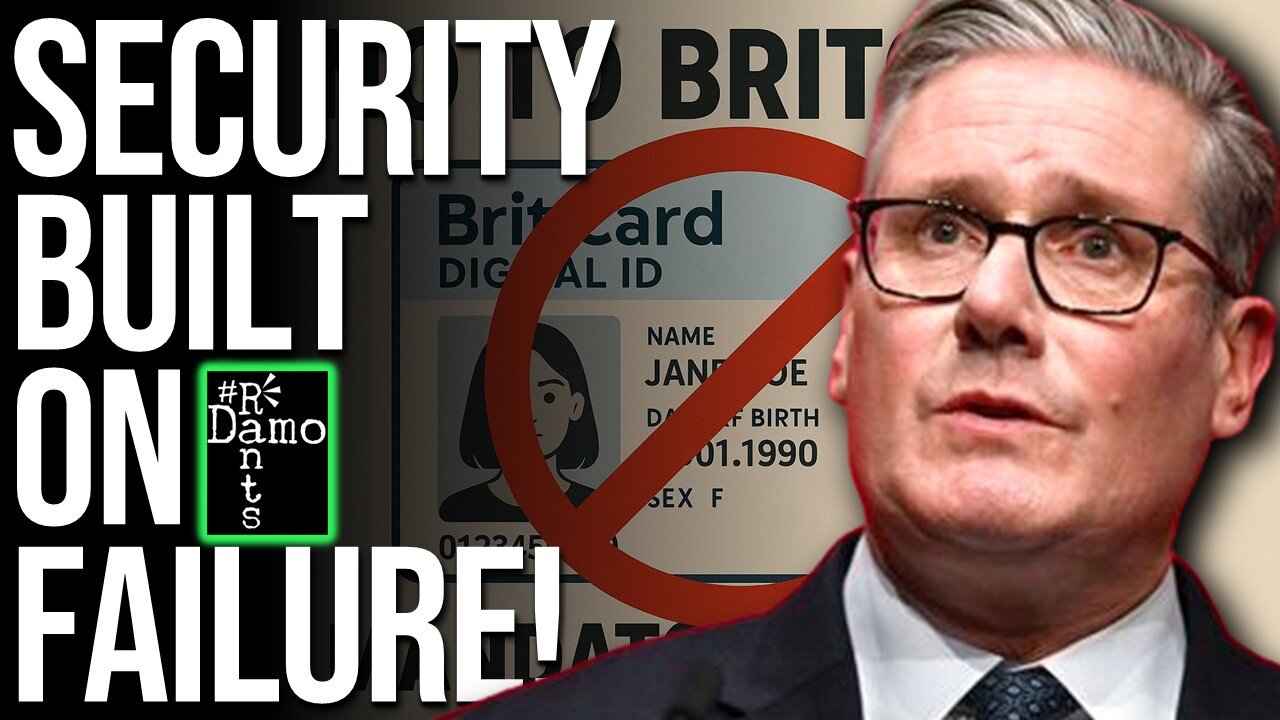Premium Only Content

The UK’s Digital ID Dream Just Became a Hacker’s Honeypot
Right, so Keir Starmer hasn’t discovered digital ID — he’s resurrecting one of Labour’s oldest obsessions in his own seeming obsession to make himself even more widely detested than he already is. From Tony Blair’s ID card plans to Gordon Brown’s “national identity register,” the party has championed this idea for two decades, dressing it up each time as efficiency, fairness, or modernisation. Keir Starmer’s BritCard is the latest rebrand: a mandatory digital identity system meant to prove competence while promising control. Competence would be a fine thing coming from Team Keith. His government says it will stop illegal migration, cut illegal working and streamline access to services. Cyber-security experts say it will create one of the largest hacking targets in Europe, not just because the model he’s copying — Estonia’s — has already been breached and suspended multiple times, but so have numerous services here in the UK, such as the NHS. UK governments have a dismal record of doing things properly and protecting our data, so what Labour calls progress looks more like a sequel to its own history of wanton public surveillance dressed up as reform and asking for trouble.
Right, so Keir Starmer calls it modernisation. His ministers call it efficiency. His think-tank calls it progress. What it looks like is malpractice on a national scale.
The “BritCard” — Labour’s proposed mandatory digital ID — is being marketed as the backbone of a new modern Britain, the administrative key to unlock everything from healthcare to housing. But behind the language of convenience lies an unprecedented risk: one system, one breach, one country exposed. Every British citizen’s identity in one vast centralised database — a single point of failure for seventy million people. Who’s prepared to bet against it?
Starmer claims this will streamline public services and deter illegal migration and working. In practice, it could create one of the largest hacking targets on Earth. Polling conducted after the announcement shows public support collapsing from just over half to barely a third, while opposition now outweighs approval. Within days of the idea being launched, a public petition opposing the scheme had crossed two million signatures. Inside Labour, senior MPs were already warning that the plan would “unnecessarily cost support.” Support Labour is losing at historic proportions already.
Starmer promised competence. BritCard is the opposite. And proving that is the model he has chosen to emulate — Estonia’s national digital ID — is one that has been hacked, suspended, and patched multiple times since it began. That is the blueprint. That is what he wants to copy.
The intellectual authors of BritCard are not civil servants or security specialists. They are Labour Together, the centrist think-tank that became Starmer’s internal policy engine. Its 2025 report, BritCard: A National Digital Identity for the United Kingdom, describes a “progressive identity credential” to be used across both public and private sectors. Every citizen, it proposes, would carry a single digital key — stored on a phone or smartcard — to verify their identity for work, welfare, housing, and finance.
I don’t particularly care for Labour Together’s unelected opinions though. They were after all fined by the Electoral Commission for breaking campaign finance law, having failed to declare hundreds of thousands of pounds in donations on time. An upcoming book, The Fraud, is set to lay that scandal bare. But the optics are damning: the same organisation once punished for opacity is now the architect of a system demanding total public transparency.
The think-tank’s cost estimates place initial development at roughly four hundred million pounds, with annual running costs up to ten million. All for something, we don’t really need. That won’t do what Starmer says it wll. The technology already exists in the private sector. Government-accredited identity providers such as Experian, GB Group, Yoti, and OneID operate under the Digital Identity and Attributes Trust Framework. Each stands to profit from the rollout though. Experian alone has secured government identity contracts worth more than ten million pounds in recent years.
It is the same pattern Britain has repeated for decades: outsourcing public infrastructure to private contractors, then buying it back at a premium. We own nothing, yet pay through the nose for the services we get, profit put before people in all things. When those contractors fail, as the history of privatisation has told us it always does, the cost lands on all of us. All because we are no longer allowed to own anything, not even our own privacy if this goes ahead now. When they are fined for data misuse, when they get fined for failure, they keep the next contract anyway. Experian was subject to an ICO Enforcement Notice in 2020 for lacking transparency and ‘invisible processing’ in its marketing operations, some of which the Tribunal later overturned or modified in 2023. Yet despite that record, it remains one of the firms most likely to compete for government digital-ID contracts. The logic of outsourcing has become circular — failure is rewarded with further responsibility.
The political sales pitch behind BritCard is simple: it will stop people working illegally in the UK. Ministers claim that by linking work, housing, and welfare checks to digital identity, those without legal status will find it impossible to function. In reality, it will do nothing of the sort.
Employers are already required to verify immigration status before hiring. We all have National Insurance numbers which prove out status and eligibility to work. The law is clear. The issue is not a lack of checks but a lack of enforcement. Those who knowingly employ undocumented workers are breaking the law deliberately, not because they lack an app. A digital ID system will not make illegal employment disappear; it will only make legitimate employers jump through more hoops.
Technology trade bodies and data-rights organisations have warned that framing digital ID as a migration tool is a political deception. It conflates administrative reform with border control, while ignoring the systemic causes of exploitation. Digitalising verification changes the interface, not the incentives. It creates the appearance of control without the substance of it.
Inside the Labour Party, several MPs have echoed those concerns. They fear the government’s rhetoric risks entrenching suspicion of migrants and minorities while alienating traditional supporters. Liz Kendall, the Secretary of State for Science, Innovation and Technology now, insists critics are “misinformed.” She describes BritCard as a “digital key to unlock better services.” But her phrasing confirms what opponents already suspect: a single credential governing access to daily life.
That is how function creep begins. A card issued for employment becomes a condition for housing. Housing links to healthcare, then to education, then to finance. Before long, what was voluntary becomes mandatory by design. It is not scaremongering; it is administrative evolution.
The government’s defence rests on one comparison: Estonia. The Baltic state is held up as proof that a digital ID system can work. Ministers repeat it endlessly. Estonia’s programme, they say, has revolutionised governance. But they never mention the rest of the record.
In 2007, Estonia was crippled by one of the world’s first major cyberattacks, targeting government, banks, and media outlets. In 2017, a cryptographic flaw in the Infineon chips used in its ID cards forced the government to suspend and reissue around 760,000 cards — more than half its population. Officials admitted the flaw could allow attackers to impersonate citizens and access data. In 2019, a further breach exposed hundreds of thousands of personal records. Estonian cyber-security authorities now record attempted intrusions every day.
Estonia survived because it is small, cohesive, and digitally literate. It has a population of 1.3 million — less than Greater Manchester — and a single, well-resourced national IT agency, yet has still been beset by all these problems. Britain has seventy million people, dozens of departments, and a patchwork of subcontractors, not to mention a government, the latest in a long line of governments who don’t believe in properly funding anything. If Estonia’s centralised identity network could be breached, scaling that model to the UK and given how the UK is run, would magnify every weakness a hundredfold.
The irony is that Estonia’s system works as well as it does because it evolved gradually and transparently. Citizens still trust it because they can see how it operates. Britain is attempting to impose one from above, by decree, with no public mandate, there was nothing in Labour’s manifesto about this, and no guarantee of safety.
Britain does not have Estonia’s record of competence. What it does have is an even longer catalogue of IT breaches. The NHS was significantly disrupted by a 2022 ransomware incident affecting a software provider. Capita, one of the government’s largest outsourcing firms, was breached in 2023, with data exfiltration from multiple pension schemes and local authority clients. Many councils that use Capita’s services were impacted. The ICO’s data-security incident register shows thousands of breaches year by year, many affecting public-sector bodies.
The cause is systemic: fragmented oversight, underfunded departments, and chronic dependence on external providers. Successive governments have treated technology as something to be bought rather than built. Each new system adds another subcontractor, another interface, another vulnerability. Accountability becomes impossible to trace.
The technical base for BritCard would almost certainly rest on the government’s existing One Login programme — the digital platform already used by millions to access dozens of public services. In March 2025, red-team security tests conducted on that system uncovered serious vulnerabilities that allowed privileged access to be compromised without detection. The findings were first reported by Computer Weekly and later confirmed by Public Technology, which noted that the Government Digital Service signed new cyber-security contracts to address the flaw and regain its trust-framework certification. Officials described the exercise as routine and said the issues had been resolved, but the episode demonstrated how fragile the architecture remains. A platform that can be breached under test conditions cannot be assumed secure once scaled to the entire population. Even without BritCard, the state has failed to secure the information it already holds. Centralising it all under one roof does not reduce the risk; it multiplies it. Every new connection becomes an entry point. Every credential becomes a key to others.
Cyber-security specialists have described the government’s digital-ID plans as a “honeypot for hackers.” Amnesty International UK and the London School of Economics’ European Politics blog both warned that concentrating millions of citizens’ identity records in a single system would create “an irresistible target” for cybercriminals and hostile actors. Other reports reached similar conclusions, quoting analysts who said that centralising sensitive data “risks creating an enormous hacking target.”
The technical concern is straightforward. Estonia’s digital-ID infrastructure, uses a semi-distributed design known as X-Road. That structure allows independent databases to communicate securely while remaining separate, reducing the impact of a breach in any one system. Britain’s proposal, according to those Computer Weekly and Public Technology stories of its “One Login” foundation, follows a centralised authentication model managed through a single government verification platform.
Security researchers quoted in these reports note that any system built on a single authentication hub expands its “attack surface” dramatically, because one compromise could expose multiple connected services. The potential reward for attackers is therefore much larger: access not to one department’s data but to a shared network of credentials spanning taxation, benefits, and identity verification. This combination — a centralised database and Britain’s long record of outsourcing critical systems — makes the country a high-value, low-resilience target in global cyber attacks.
The companies likely to deliver the system — Experian, GB Group, Yoti, OneID — are private corporations with shareholders, not public guardians with statutory duties. Their commercial incentive is profit, not protection. Even firms fined for data misuse remain eligible for contracts under the government’s trust framework. It is a cycle of risk without consequence.
Every layer of outsourcing adds opacity. When the next breach occurs — and it will — the government will blame the contractor, the contractor will blame the subcontractor, and citizens will be left to prove their own identity to the very system that lost it.
BritCard is more than a technical project; it is a political statement. It says that the path to efficiency is control, that surveillance can be sold as convenience, and that privacy is expendable if the branding sounds progressive.
Ministers insist the scheme is not about monitoring, but every justification offered — migration, welfare, fraud prevention — depends on monitoring. The government’s own documents describe BritCard as an “identity layer” for both public and private transactions. That means one credential linking tax, benefits, healthcare, banking, and employment. Convenience becomes the bribe for compliance.
Civil-liberties organisations warn that such a system will inevitably expand beyond its stated purpose. It is not speculation; it is precedent. Each previous attempt to digitise state functions has led to broader surveillance powers. The “right to rent” checks introduced to target illegal tenancies became tools for racial profiling. Automated benefit algorithms created wrongful sanctions. A national digital ID would combine those powers under one infrastructure.
Even within Labour, discomfort is growing. Backbench MPs warn that the policy risks alienating working-class voters already disillusioned with central control. The government insists the system will be “voluntary at first,” echoing Tony Blair’s language from 2006. But once linked to essential services, voluntary becomes meaningless. You cannot opt out of society, no matter how many MP’s still cling to the old Thatcherite mantra of there being no such thing.
BritCard is not an innovation; it is a market opportunity. Britain’s digital-identity industry is worth around two billion pounds a year. Over two hundred and seventy companies operate in the sector, many lobbying for state contracts. The line between policy and procurement has blurred. Those who design the framework often end up supplying it.
The government calls this “public-private partnership.” In practice, it means privatising the state’s most sensitive functions. Once embedded, these systems are almost impossible to unwind. Terminating contracts would cost billions; maintaining them guarantees dependency. The technology becomes permanent, even when the politics changes. That is the real motive for corporate enthusiasm — once the infrastructure exists, it will generate revenue indefinitely.
A single breach of the BritCard system would have consequences far beyond embarrassment. It would threaten the state’s ability to function. Every modern service — from pensions to payroll — would rely on the integrity of that digital credential. If it fails, the entire administrative chain collapses.
Britain’s Information Commissioner recorded nearly nine thousand data breaches last year, forty-three per cent involving public administration or healthcare. Adding a universal identity layer will not reduce those numbers. It will amplify their impact. Even a partial compromise could disable tax collection, benefit payments, or hospital access.
Estonia’s experience shows how fast such a crisis unfolds. When its ID system was suspended, millions of transactions froze overnight. For a small state, that was recoverable. For a country of Britain’s size and complexity, it would be catastrophic. The recovery cost would dwarf any saving BritCard promises.
The fatal flaw in BritCard is not just technica thoughl; it is moral. Estonia’s success depends on trust built over two decades. Britain has no such reservoir. Decades of scandals have eroded confidence in official competence. Each new breach makes the next one easier to predict and harder to forgive.
The government cannot demand trust while outsourcing accountability. It cannot claim security while repeating the same contracting mistakes that produced the last generation of failures. It cannot ask citizens to centralise their identities when it cannot protect the data it already holds.
Starmer’s administration wanted BritCard to symbolise competence. It now symbolises conceit: the assumption that technology can replace integrity.
BritCard is not the future; it is the next major British failure waiting to happen. It combines the worst instincts of modern governance — managerial arrogance, corporate dependence, and political denial — into one system that magnifies risk for every citizen.
The government claims it will make Britain safer. It will make Britain searchable. Every person, every interaction, one click away from exposure. Estonia built its digital identity on trust. Britain is building it on marketing.
The lesson is written both in digital code and history alike. Centralised control without competence is not progress; it is regression just with better graphics.
No doubt many a legal challenge will ensue from this should it get rolled out, much like Starmer’s Palestine Action ban, now facing not just one legal challenge but two as all new evidence has come to light, utterly destroying the governments excuses over it. Get all the details of that story in this video recommendation here as your suggested next watch.
Please do also hit like, share and subscribe if you haven’t done so already so as to ensure you don’t miss out on all new daily content as well as spreading the word and helping to support the channel at the same time which is very much appreciated, holding power to account for ordinary working class people and I will hopefully catch you on the next vid. Cheers folks.
-
 56:01
56:01
BonginoReport
2 hours agoAI Trump SH*TS On Harry Sisson - Nightly Scroll w/ Hayley Caronia (Ep.159)
8.69K13 -
 LIVE
LIVE
Side Scrollers Podcast
1 day ago🔴SIDE SCROLLERS FUND-A-THON🔴DAY 1🔴100% REVENUE HELPS CHANGE CULTURE!
921 watching -
 LIVE
LIVE
StoneMountain64
4 hours agoBattlefield 6 is ALREADY getting BETTER
108 watching -
 1:03:40
1:03:40
TheCrucible
3 hours agoThe Extravaganza! EP: 56 with Geust co-host Rob Noerr (10/20/25)
12.7K4 -
 LIVE
LIVE
GritsGG
8 hours agoDuos Into Ranked Top 70! Most Wins in WORLD! 3744+!
52 watching -

Donald Trump Jr.
4 hours agoDems Buy One Way Ticket to Crazytown, Plus Interview with AJ Rice! | Triggered Ep.284
37.1K41 -
 1:54:09
1:54:09
Redacted News
3 hours agoBREAKING! Another Trump assassination plot foiled? New info in Charlie Kirk's murder | Redacted
155K153 -
 LIVE
LIVE
Quite Frankly
5 hours agoNo Kings Clown Pill, Gov't Shutdown, EXTRAS! | Rich Baris 10/20/25
476 watching -
 LIVE
LIVE
The Mike Schwartz Show
3 hours agoTHE MIKE SCHWARTZ SHOW Evening Edition 10-20-2025
3,653 watching -
 1:28:59
1:28:59
Kim Iversen
4 hours agoTrump EMBARRASSED: Gets Played by Israel AND China
20.3K86